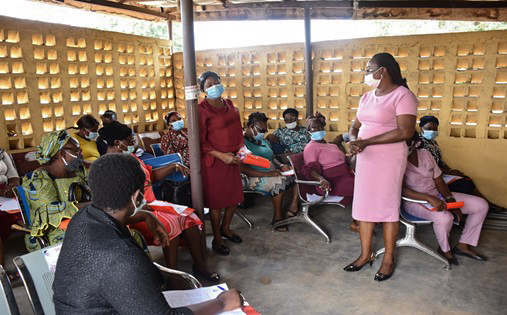A Primary Health Center in Nigeria Improves Malaria Preventive Services for Pregnant Women
A Primary Health Center in Nigeria Improves Malaria Preventive Services for Pregnant Women
![[Mrs. Folake Ajayi takes her IPTp while being observed by health care workers during ANC at PHC Oniyanrin.] {Photo credit: Dr. Stanley Ugah}](https://msh.org/wp-content/uploads/2021/06/3-2.jpg)
Malaria is common among pregnant women in Oyo State, Nigeria, which increases the risk of maternal anemia, low birth weight, premature delivery, stillbirth, and death of infants. Although intermittent preventive treatment of malaria in pregnancy (IPTp) helps prevent these adverse effects for pregnant women and their unborn children, its uptake in the state is poor. Indeed, IPTp uptake across health facilities in Oyo State was less than 50% from April 2019 to February 2020, when the U.S President’s Malaria Initiative for States (PMI-S) project started supporting the state. Some challenges to high IPTp uptake include an inadequate supply of sulfadoxine-pyrimethamine (SP), a drug used to prevent malaria, and lack of drinking water in antenatal clinics for enrolled pregnant women to take SP while being observed by health workers.
As part of its mandate to improve IPTp services in supported states, the PMI-S project supports State Malaria Elimination Programs (SMEPs) and health facilities in Oyo and seven other states in Nigeria to improve malaria diagnosis and treatment among pregnant women to reduce deaths caused by malaria. The Primary Health Centre (PHC) Oniyarin, Ibadan, is one of the 1,404 health facilities PMI-S supports to prevent and control malaria across 33 local government areas in Oyo State. The PHC provides primary health care services to a catchment population of over 9,000 people. The services provided include antenatal care (ANC) services to an average of 250 pregnant women monthly. Prior to PMI-S support, PHC Oniyanrin could not adequately cater to the IPTp needs of up to 50% of pregnant women enrolled in the health facility, hence, poor uptake and completion of IPTp was recorded in the facility. This is not unconnected with inadequate supply and lack of SPs and lack of awareness on the World Health Organization’s (WHO) recommendation on the administration of IPTp.

PMI-S supported the management of PHC Oniyarin to address the low IPTp uptake by working with the Oyo SMEP to transfer knowledge and skills to health workers in the facility on how to manage stocks to ensure sustained availability of SPs in the facility. The project also worked with the SMEP to educate pregnant women visiting the facility on the need to complete their SP doses as recommended by WHO. In addition, the project worked with the facility to improve and sustain the availability of drinking water during ANC clinics to enable health care workers observe pregnant women taking SPs as directly observed therapy.
Oladoyinbo R.O., the Officer-in-Charge at PHC Oniyanrin says PMI-S support to the facility has contributed to a significant increase in IPTp uptake in the health facility. “The ANC providers’ orientation meeting conducted by PMI-S and SMEP made us realize that stock-out of IPTp was not an option for us. During periods when we had delays in restocking, we always had to stand in the gap and ensure availability of sulfadoxine-pyrimethamine for IPTp at our ANC clinics. My joy in this success is predicated on our ability to sustain the provision of IPTp for our pregnant clients and the fact that they appreciate the importance of taking IPTp.”
With the improvement in services, pregnant women visiting the facility have been consistent in attending their scheduled ANC clinics. This is evident in PHC Oniyarin’s improvement in its average IPTp uptake score from approximately 44% (January, February, and March 2020) to 89.4% (December 2020, January 2021, and February 2021).
One of the pregnant women who visits PHC Oniyanrin for ANC said that health care workers in the facility have been helpful in ensuring that IPTp is available for her and other pregnant women. The facility has been supportive through health talks given during scheduled ANC visits. She added that health care workers teach her and other pregnant women how to sleep inside an insecticide-treated net and explain that IPTp protects pregnant women and unborn children from getting malaria.
“We were taught that the drug is usually started after the first 3 months and is given every 4 weeks apart until delivery. I have taken it 2 times and I never reacted or experienced any side effects. We are given the drugs and clean drinking water to take the drugs during ANC. We are always reminded of the importance of IPTp and we have also understood that taking the drug at the right times is for our own benefit,” says Mrs. Folake Ajayi, a pregnant client at PHC Oniyanrin.
This success guarantees that more pregnant women visiting the facility will experience malaria-free pregnancies and have healthier babies, thanks to the state government and the American people.